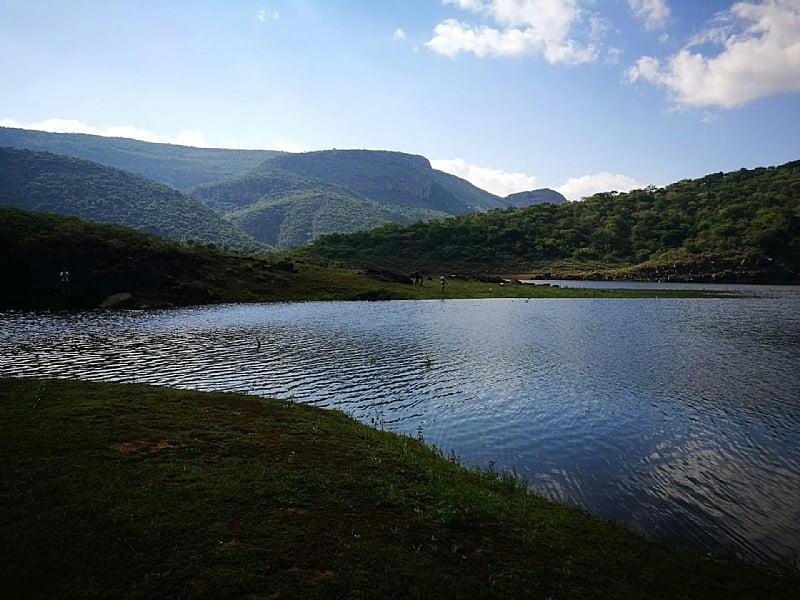Nature isn’t confined to officially protected areas. A lot can be done to conserve biodiversity in other places too. The United Nations Convention on Biological Diversity agreed in 2018 on the idea of “other effective area-based conservation measures” (OECMs). These are geographically defined areas which can be managed in ways that protect biodiversity, ecosystem functions and “where applicable, cultural, spiritual, socio-economic, and other locally relevant values.” Geographer Ndidzulafhi Innocent Sinthumule has explored the potential for sacred natural sites in South Africa to contribute to nature conservation.
Why does South Africa need to protect more land?
In South Africa, although protected areas play a vital role in biodiversity conservation, they are not sufficient. A lot of biodiversity occurs outside formal protected areas. Protected areas make up only 9.2% (or 11,280,684 hectares) of the country’s total land area. The National Protected Area Expansion Strategy, which was last updated in 2016, aims to increase the percentage of protected areas in the country to 16%.
My view is that the target can only be achieved by recognising other areas that have high conservation value, such as sacred natural sites. These are places with special spiritual and cultural value.
Recognising sacred natural sites as “other effective area-based conservation measures” entails officially declaring them as protected areas.
There are also other sites with conservation potential. These could be on public, private or community land. This means they are governed by a variety of rights holders. Apart from sacred natural sites, other examples include military land and waters, and locally managed marine areas.
Whatever their other, primary purpose, they can also deliver conservation of biodiversity.
Where are South Africa’s sacred natural sites?
There are areas in South Africa known as sacred sites because of their cultural, spiritual, or historical value, often linked to ancestral beings, religion and traditional beliefs.
They are often places of reverence, where rituals, ceremonies, burials, or pilgrimage are conducted, and where the custodians of the areas feel a deep connection to something larger than themselves.
Examples of sacred natural sites include these in Limpopo province, in the north of the country:
In the province of KwaZulu-Natal, there are Mazizini and Mabasa forests, regarded as sacred by local communities.
In the Free State province, the local Basotho people regard certain caves as sacred and ancestral sites:
How do the sites fit in with protecting diversity?
The study aimed to assess opinions and perceptions about the opportunities and challenges of sacred natural sites in contributing to global conservation goals.
I interviewed academics involved in research on Indigenous knowledge, people involved in discussions about conservation, and custodians of sacred natural sites – 39 people in all.
Study participants identified a number of opportunities. They said:
Sacred natural sites frequently harbour high levels of biodiversity, including rare and endemic species, because they have been protected for a long time through cultural practices. Giving them more legal protection and funding, and integrating them into national conservation strategies, would protect hotspots of biological diversity.
Integrating traditional ecological knowledge and practices into mainstream conservation efforts would promote more inclusive and culturally sensitive approaches to environmental management.
It would expand the total land area under conservation.
It might create conservation corridors that would facilitate movement of animals and ecological processes between isolated habitat patches.
Sacred natural sites could serve as carbon sinks or storehouses of carbon emissions. Sacred forests have old, tall trees and well developed canopy – the layer of foliage that forms the crown of a forest.
They can serve as tourist destinations where visitors will learn about biodiversity and about religious and cultural practices.
The study participants also identified challenges.
A big one was access rights and harmonising cultural and formal conservation practices. Access to sacred natural sites and the use of resources by the public is usually not permitted.
There was a fear that external intervention by government, nongovernmental organisations and conservationists might sideline local people and lead to the loss of their sacred sites.
External interventions might promote scientific knowledge at the expense of the traditional ecological knowledge that has protected sacred natural sites for millennia.
Respondents were concerned about elites capturing all the benefits and not sharing them equitably.
A methodological challenge might be how to study conservation effectiveness while respecting cultural sensitivities.
How would a sacred natural site be officially recognised?
At the moment, sacred natural sites are not designated or recognised as an “other conservation measure”. Currently, there are no standard procedures, criteria, or guidelines available for declaring them as such in South Africa. These would have to be determined by the national Department of Forestry, Fisheries and the Environment.
The process should begin with identifying all sacred natural sites to understand where they are and what contribution they could make towards biodiversity conservation. The department should do this in consultation with local communities and traditional leaders who understand the local environment. It should be in line with the international principle of Free, Prior, and Informed Consent. This acknowledges the right of Indigenous peoples to give or withhold their consent for any action that would affect their lands.
This will set up sacred natural sites as a conservation model that contributes to both biodiversity protection and cultural heritage preservation. The involvement of communities will ensure that sacred natural sites are a sustainable solution.
All the respondents in my study said that designating a site as an “other conservation measure” should give control or legal protection, ownership and stewardship roles to local communities who have protected the area for ages.
Ndidzulafhi Innocent Sinthumule does not work for, consult, own shares in or receive funding from any company or organisation that would benefit from this article, and has disclosed no relevant affiliations beyond their academic appointment.
By Ndidzulafhi Innocent Sinthumule, Associate Professor, University of Johannesburg


